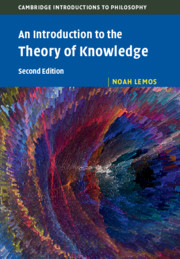76 results
11 - Naturalized Epistemology
-
- Book:
- An Introduction to the Theory of Knowledge
- Published online:
- 11 November 2020
- Print publication:
- 26 November 2020, pp 219-236
-
- Chapter
- Export citation
7 - Epistemic Circularity
-
- Book:
- An Introduction to the Theory of Knowledge
- Published online:
- 11 November 2020
- Print publication:
- 26 November 2020, pp 134-150
-
- Chapter
- Export citation
4 - The Coherence Theory of Justification
-
- Book:
- An Introduction to the Theory of Knowledge
- Published online:
- 11 November 2020
- Print publication:
- 26 November 2020, pp 70-90
-
- Chapter
- Export citation
Preface to the Second Edition
-
- Book:
- An Introduction to the Theory of Knowledge
- Published online:
- 11 November 2020
- Print publication:
- 26 November 2020, pp ix-xii
-
- Chapter
- Export citation
3 - Foundationalism
-
- Book:
- An Introduction to the Theory of Knowledge
- Published online:
- 11 November 2020
- Print publication:
- 26 November 2020, pp 46-69
-
- Chapter
- Export citation
9 - The Problem of the Criterion
-
- Book:
- An Introduction to the Theory of Knowledge
- Published online:
- 11 November 2020
- Print publication:
- 26 November 2020, pp 177-197
-
- Chapter
- Export citation
6 - Internalism and Externalism about Justification
-
- Book:
- An Introduction to the Theory of Knowledge
- Published online:
- 11 November 2020
- Print publication:
- 26 November 2020, pp 115-133
-
- Chapter
- Export citation
5 - Reliabilism and Virtue Epistemology
-
- Book:
- An Introduction to the Theory of Knowledge
- Published online:
- 11 November 2020
- Print publication:
- 26 November 2020, pp 91-114
-
- Chapter
- Export citation
Index
-
- Book:
- An Introduction to the Theory of Knowledge
- Published online:
- 11 November 2020
- Print publication:
- 26 November 2020, pp 273-278
-
- Chapter
- Export citation
Contents
-
- Book:
- An Introduction to the Theory of Knowledge
- Published online:
- 11 November 2020
- Print publication:
- 26 November 2020, pp vii-viii
-
- Chapter
- Export citation
10 - The A Priori
-
- Book:
- An Introduction to the Theory of Knowledge
- Published online:
- 11 November 2020
- Print publication:
- 26 November 2020, pp 198-218
-
- Chapter
- Export citation
2 - The Traditional Analysis and the Gettier Problem
-
- Book:
- An Introduction to the Theory of Knowledge
- Published online:
- 11 November 2020
- Print publication:
- 26 November 2020, pp 22-45
-
- Chapter
- Export citation
Dedication
-
- Book:
- An Introduction to the Theory of Knowledge
- Published online:
- 11 November 2020
- Print publication:
- 26 November 2020, pp v-vi
-
- Chapter
- Export citation
12 - Testimony and Disagreement
-
- Book:
- An Introduction to the Theory of Knowledge
- Published online:
- 11 November 2020
- Print publication:
- 26 November 2020, pp 237-260
-
- Chapter
- Export citation
Select Bibliography
-
- Book:
- An Introduction to the Theory of Knowledge
- Published online:
- 11 November 2020
- Print publication:
- 26 November 2020, pp 261-272
-
- Chapter
- Export citation
8 - Skepticism
-
- Book:
- An Introduction to the Theory of Knowledge
- Published online:
- 11 November 2020
- Print publication:
- 26 November 2020, pp 151-176
-
- Chapter
- Export citation
Copyright page
-
- Book:
- An Introduction to the Theory of Knowledge
- Published online:
- 11 November 2020
- Print publication:
- 26 November 2020, pp iv-iv
-
- Chapter
- Export citation
1 - Knowledge, Truth, and Justification
-
- Book:
- An Introduction to the Theory of Knowledge
- Published online:
- 11 November 2020
- Print publication:
- 26 November 2020, pp 1-21
-
- Chapter
- Export citation
12 - Morality and Common Sense
- from Part II
-
-
- Book:
- The Cambridge Companion to Common-Sense Philosophy
- Published online:
- 06 November 2020
- Print publication:
- 19 November 2020, pp 265-286
-
- Chapter
- Export citation

An Introduction to the Theory of Knowledge
-
- Published online:
- 11 November 2020
- Print publication:
- 26 November 2020
-
- Textbook
- Export citation

